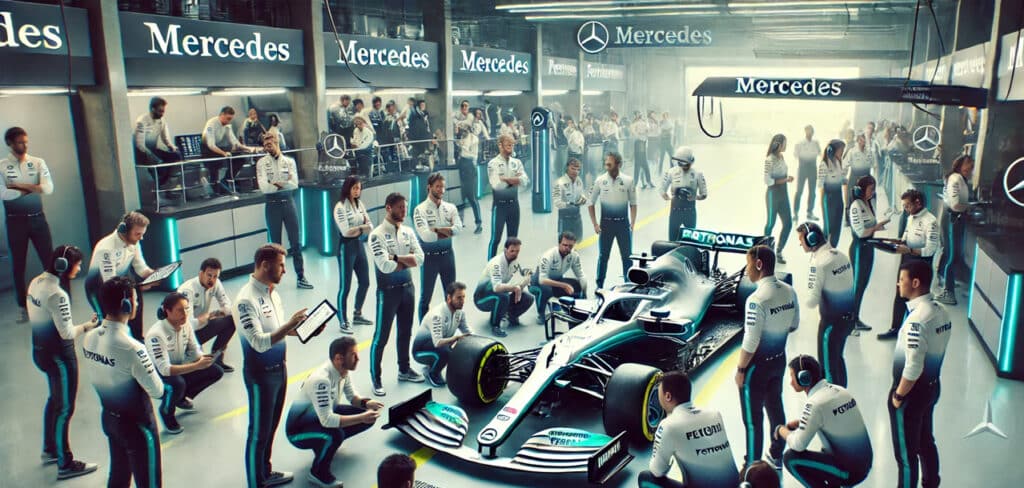The Power of Personalised Development and Culture in High-Performance Teams

Introduction
In today’s rapidly evolving business landscape, the differentiators that set the most successful teams apart are often not just their operational strategies, leadership or technology. Increasingly, what defines high-performing teams is their commitment to people development coupled with a purposeful culture. These two elements create a powerful synergy that drives sustainable success, both in teams and organisations.
Mercedes F1: An Example of Unrivalled Success
A prime example of this in action is the Mercedes-AMG Petronas Formula One Team, one of the most successful teams in the history of motorsport who from 2014 to 2021, won a staggering eight constructors’ titles in a row. Under the leadership of Toto Wolff, Mercedes has not only dominated the Constructors’ and Drivers’ Championships for several consecutive years but has also become known for a culture that is deeply embedded in personal development and relentless improvement.

Mercedes has embraced a leadership model that promotes continuous development from the top down, empowerment, and accountability at every level. From their top drivers (Lewis Hamilton) to mechanics and engineers, they are all encouraged to own their personal growth and align it with the team’s goals. This investment in people, paired with a clear vision of excellence, allowed Mercedes to stay ahead in a highly competitive, fast-paced environment where small margins and performance are paramount.
Culture and Personalised Development as Critical Differentiators
Recent research from the Institute for Corporate Productivity (i4cp) has shown that high-performance organisations are 5.5 times more likely to have robust Leadership and Talent pathways in place. As Mercedes F1 demonstrates, culture is not just an intangible concept but a deliberate and structured framework that guides decision-making, behaviour, and, ultimately, performance.
Personalised development is also becoming increasingly important, particularly as workforces become more diverse, dispersed and multi-generational. Studies from the Centre for Creative Leadership (CCL), published in 2023, show that teams with strong leadership development programs outperform their peers, often driving higher engagement and retention rates. Businesses that offer tailored development programs—just like the performance coaching and support systems seen in the Mercedes F1 team—create environments where individuals thrive and collectively drive the organisation to greater heights.
Future Trends and Societal Needs
As work becomes more digital and flexible, a shift toward people-centric development is no longer a “nice to have” but a necessity. The World Economic Forum’s Future of Jobs Report published in May 2023, highlights that the top skills for future workforces will be centred around leadership, emotional intelligence, and adaptability—core components of strong cultural and development programs. Forward-thinking companies are integrating well-being, mental health, and leadership coaching into their cultures, recognising that when employees feel supported and developed, they perform better.
Simple Framework for Organisations
To foster a culture of continuous people development, organisations should consider the following elements involved in our Steering Point framework:
- Individual Growth Plans (IGPs): Tailored development programmes that align individual growth with company goals
- Leadership Development: Ongoing training for leadership teams to model and cultivate the desired culture
- Regular Feedback Loops: Structured feedback that encourages both personal and collective improvement
- Recognition Systems: Acknowledge not just performance, but also learning, collaboration, and adaptability
Conclusion
In a world where high performance is often synonymous with innovation and agility, companies that prioritise the development of their people and foster a strong culture will set themselves apart. As Mercedes F1 has demonstrated, investing in people and cultivating a growth mindset across all levels not only yields impressive results but also builds a lasting legacy of excellence.
However, many organisations and leaders still overlook the importance of consistent and intentional people development. Cultivating high performance within a team is much like tending to a garden. Just as a gardener regularly weeds, water, and nurture their plants to encourage healthy growth, leaders must consistently invest in their teams to foster an environment where potential has no choice but to flourish. In the end, the most sustainable success stems from a workforce that feels valued, engaged, and equipped to meet future challenges.
More on Growth Mindset
Building A Resilient Workforce : The Power of A Growth Mindset
High Standards and Low Expectations: a Blueprint for Wellbeing